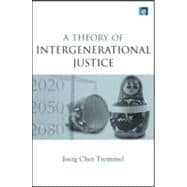
Note: Supplemental materials are not guaranteed with Rental or Used book purchases.
Purchase Benefits
What is included with this book?
| List of Figures and Tables | p. vii |
| Acknowledgments | p. xi |
| List of Acronyms and Abbreviations | p. xiii |
| Introduction | p. 1 |
| Mankind's increasing powers | p. 1 |
| The no-man's-land of ethics | p. 3 |
| Ethics of the future - in a double sense | p. 4 |
| Distinguishing generational justice from sustainability | p. 7 |
| The role of philosophy | p. 9 |
| Outline of the book | p. 10 |
| Criteria-based Definitions of Scientific Terms | p. 13 |
| Four criteria for definitions | p. 14 |
| Comparisons between Generations | p. 19 |
| The ambiguity of the term 'generationÆ | p. 19 |
| Irrelevance of societal generations for intergenerational justice theories | p. 21 |
| Relevance of family-related generations for intergenerational justice theories | p. 21 |
| Temporal and intertemporal generational justice | p. 22 |
| Direct and indirect comparisons of chronological generations | p. 25 |
| Comparisons between generations in various fields | p. 28 |
| Comparisons: The field of ecology as an example | p. 28 |
| Comparison of life courses | p. 31 |
| Summary | p. 32 |
| Objections to Theories of Generational Justice | p. 35 |
| Non-identity problem | p. 35 |
| Future individuals cannot have rightsÆ | p. 46 |
| Summary | p. 63 |
| What to Sustain? Capital or Well-being as an Axiological Goal? | p. 65 |
| Societal targets and concepts of justice | p. 65 |
| The capital approach | p. 65 |
| The well-being approach | p. 91 |
| Measuring well-being | p. 108 |
| Advantages and disadvantages of the capital approach and the well-being approach | p. 141 |
| Average utilitarianism vs. total utilitarianism: a repugnant conclusion? | p. 142 |
| How Much to Sustain? The Demands of Justice in the Intergenerational Context | p. 147 |
| A compass for the no-man's-land? | p. 147 |
| The applicability of intragenerational justice theories in the intergenerational context | p. 147 |
| Justice as impartiality: Rawls' 'original positionÆ theory | p. 150 |
| Justice as the equal treatment of equal cases, and the unequal treatment of unequal cases | p. 171 |
| Justice as reciprocity | p. 183 |
| Intergenerational justice as enabling advancement | p. 196 |
| Conclusion | p. 201 |
| Notes | p. 205 |
| References | p. 231 |
| Index | p. 257 |
| Table of Contents provided by Ingram. All Rights Reserved. |
The New copy of this book will include any supplemental materials advertised. Please check the title of the book to determine if it should include any access cards, study guides, lab manuals, CDs, etc.
The Used, Rental and eBook copies of this book are not guaranteed to include any supplemental materials. Typically, only the book itself is included. This is true even if the title states it includes any access cards, study guides, lab manuals, CDs, etc.